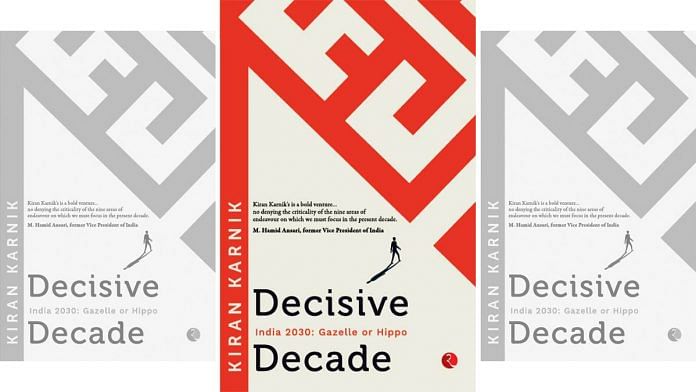
New Delhi: A new book by Kiran Karnik, who describes himself as a “public non-intellectual”, seeks to understand where India will be by 2030. He focuses on nine crucial areas to figure this out — democracy and politics, security, health, education, economy, demography, society, jobs and livelihoods, and technology.
Published by Rupa Publications, the book ‘Decisive Decade’ will be launched on 2 June on ‘SoftCover’ —ThePrint’s e-venue to launch select non-fiction books.
Karnik’s book takes an optimistic view of the future and aims to create a shared national vision towards which it charts out a road map.
In taking an objective but hard hitting view of India, Karnik relies on his experience and observations to argue why the “2020s will be a make-or-break decade for India”.
The book has received roaring praise from former president of India Hamid Ansari who said: “Futurology is an inexact discipline, an odd mix of determinants and in- determinants. For this reason, Kiran Karnik’s bold venture, more so because the typology of ‘gazelle’ and ‘hippo’ tends to underplay the diversity of the animal kingdom and its techniques of survival and success.”
Former finance secretary Vijay Kelkar described how Karnik “lucidly illuminates the decisive policy challenges that our beloved country will be facing in the coming decade”.
“Thankfully, he also offers thoughtful proposals for taking actions and achieving what he beautifully describes as the ‘gazelle’-like outcomes. I warmly recommend everyone to read this wonderful book, infused so much with hope and wisdom,” Kelkar added.
Karnik has previously authored the book Crooked Minds and Evolution. In an illustrious career, Karnik has worked in India’s space programme and the television industry, served on high-level government committees such as the Scientific Advisory Council to the prime minister and the National Innovation Council over the last few decades.
His last assignment was president of NASSCOM, the association of India’s IT industry. He now spends most of his time with educational and civil society organisations.
Subscribe to our channels on YouTube & Telegram
Why news media is in crisis & How you can fix it
India needs free, fair, non-hyphenated and questioning journalism even more as it faces multiple crises.
But the news media is in a crisis of its own. There have been brutal layoffs and pay-cuts. The best of journalism is shrinking, yielding to crude prime-time spectacle.
ThePrint has the finest young reporters, columnists and editors working for it. Sustaining journalism of this quality needs smart and thinking people like you to pay for it. Whether you live in India or overseas, you can do it here.